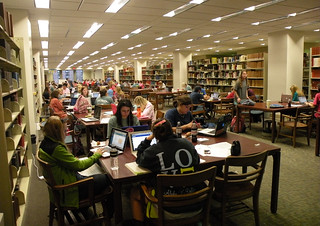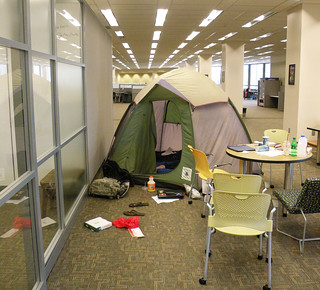Auburn's Ralph Brown Draughon: not your average library
Article body
Finals week has arrived at Auburn University – a time of crammed study sessions and all-nighters. Luckily for Auburn students, Ralph Brown Draughon Library, or RBD, remains open 24 hours a day throughout the exam period, when it is arguably the busiest place on campus.
Based on input from those who use the library, RBD has continually updated its services. For example, the library was not always open 24 hours a day during the week. The Student Government Association, or SGA, worked with the library to create an around-the-clock finals event – Up All Night. Partnering with SGA and Student Counseling Services, during finals the library serves orange juice and doughnuts, gives away scantrons, creates stress-relieving activities and sometimes even has professional massages.
Specific floors are dedicated to allowing different levels of noise, which is especially important during periods of intense study such as finals. To prepare for exams, some students enjoy working in groups and having animated discussions, but for those who prefer to study in silence, the fourth floor is a dedicated "quiet" floor.
Jayson Hill, marketing and public relations communicator for Auburn University Libraries, reports that students have even been known to pitch a tent or bring sleeping bags.
The library supplies a cornucopia of academic resources to Auburn students and faculty and continues to provide a productive learning environment year-round.
The library opened early in 1963 and was dedicated officially later that year. Named for Auburn's 10th president, the Draughon Library holds 3.4 million volumes in 380,000 square feet of space.
Since it opened, RBD has expanded in more ways than physical size and volume capacity. Library staff members have created an accommodating study area and, with the use of opinion surveys, are constantly looking for new ways to expand student and faculty resources.
"One of the biggest things we heard over and over was a demand for food," said Dean of Auburn University Libraries Bonnie MacEwan.
A popular feature is Caribou Coffee, located at the library's main entrance. With the assistance of Campus Dining, Caribou Coffee supplies library visitors with a variety of beverages and food items. Sometimes, you might even find an Auburn "star" working the counter; in the spring 2014 semester Bruce Pearl, Auburn's new basketball coach, spent some time preparing coffee for students while they studied.
The Study E.R. was constructed in the Learning Commons area of the library in September 2012. This miniature store sells all the library essentials: writing utensils, whiteboard materials, scantrons, paper, drinks, snacks and even sweatshirts.
Technology has inspired many changes in the library. During a major renovation to the Learning Commons on the second floor in 2009, freshmen Student Government Association members were asked to "draw their perfect library." The results helped make decisions such as table shape and overall layout.
An architecture and design company that focuses on library space and facility optimization, Group3 Planners, was hired to produce the new library layout. The book stacks were condensed to cover half the original space, giving students more room to spread out. Computer labs and public computers were added in now open spaces throughout the library.
One of the main design changes Group3 made was to put everything on wheels, which is why most of the newer tables and chairs are wheeled for easy mobility. The seating updates to the Learning Commons include 415 new, wheeled seats.
"Power walls" were installed in the Learning Commons, which produced the feeling of seclusion instead of one wide space. The miniature walls provide the illusion of a group or individual study room and include several electrical outlets. "There are over 300 power outlets in the Learning Commons," Hill said.
There are also three media:scape locations on the second floor. According to the library website, the media:scape system offers a "walk up and connect" solution that allows up to six MS Windows or Apple laptops to be simultaneously connected to a monitor. Users can then switch between computer video feeds with just the touch of a button—facilitating the sharing and comparing of ideas in a collaborative learning environment.
Extra-large-sized booths, wider traditional study cubicles and boomerang-shaped tables have been added to each floor. These wider tables are designed to accommodate laptops as well as traditional study materials. All of the new cubicle and table designs also include several power outlets at each station.
"The extra table space shows the transition into modern learning," Hill said. "You have more than books now. You have to think about laptops too, and you can never have enough power."
With laptops in mind, and with the collaboration of the Office of Information Technology, or OIT, there is also a PC repair shop located inside RBD. Students can call or work directly with OIT to address laptop problems. If the laptop needs fixing, the shop charges only for parts, not for time or consultation. Students may also check-out laptops to borrow or use a laptop lock, which is intended to secure laptops to tables if you need to momentarily leave a study area.
The library also has a Media Digital Resource Laboratory, or MDRL, which includes microform scanners and printers with the capability to scan and print anything up to 34 inches wide. Anything printed in the MDRL for academic purposes is free. There are also DVDs and CDs available to checkout, a large collection of government documents and maps and even a room for audio recording and editing.
The library also hosts several events throughout the year to encourage student participation:
- Information Oasis: During the first couple days of the new school year, library staff members pass out water and snacks to students. This is a way for students to receive information about the tools and resources the library has to offer.
- Tailgate at the Library: Football is a popular pastime at Auburn and the Library creates a tailgate experience for the students. There's free food, the Auburn University Marching Band, the cheerleaders and Aubie.
- Humans vs. Zombies: Around 200 students register every year. This event happens on a Friday night after the library has closed. Students then play a tag-like game that involves chase and the illusion of battling for survival. According to library surveys, student opinion of the Library particularly increases after the Humans vs. Zombies experience.
"If the students participate in all the fun activities the library has to offer, they end up touring the entire library," MacEwan said. "First, we have to get them in the building."
The demand of new technology doesn't stop with computer use. One section of the fourth floor includes adaptive lighting. This means when the natural light shines through the large window, not all the lights are on. Once the sun begins to set, more lights come on, which saves energy. The library recently won the Auburn University Spirit of Sustainability Award from the Auburn University Office of Sustainability for this adaptation.
"I think we'll continue to see a movement toward more digital resources," Hill said. "Already most of the materials budget goes to electronic resources rather than physical volumes. Student study space will continue to be improved. The fourth floor is being improved for more quiet space, and the third floor, almost untouched as far as seating and other furniture goes, should see renovations in the future."
Hill said that although all the technological and food craving advances make for an adaptive and enjoyable learning environment, it's important to remember that the library also carries books. He noted that for both pleasure or for educational purposes, many library visitors still enjoy sitting between the stacks and getting lost in literary pages.
Other library resources include:
- Night security and an Auburn night security shuttle to provide safety measures for late night studiers. The security shuttle runs from 6 p.m. to 7 a.m. For use call (334) 844-7400
- Supplemental Instruction desk: a branch of academic support designed to help students succeed in historically difficult courses
- Tiger Advisor: general academic advising for all students, open Monday through Thursday from 3 to 8 p.m.
- Miller Writing Desk: free one-on-one writing consultation
- Study Partners: Auburn's official undergraduate peer tutoring program
- Reference desk open until midnight most nights
- Group study rooms, including one dedicated to the Honors College and one dedicated to graduate students and faculty
- International Scholars English Center: a free English language tutoring service for international students
- Circulation desk and textbook reserve
- Two other library branches: one for architecture students and the other for veterinary students
Related Media
Related Links
Media interested in this story can contact Communications Director Preston Sparks at (334) 844-9999 or preston.sparks@auburn.edu.
Auburn University is a nationally ranked land grant institution recognized for its commitment to world-class scholarship, interdisciplinary research with an elite, top-tier Carnegie R1 classification, life-changing outreach with Carnegie’s Community Engagement designation and an undergraduate education experience second to none. Auburn is home to more than 30,000 students, and its faculty and research partners collaborate to develop and deliver meaningful scholarship, science and technology-based advancements that meet pressing regional, national and global needs. Auburn’s commitment to active student engagement, professional success and public/private partnership drives a growing reputation for outreach and extension that delivers broad economic, health and societal impact.








